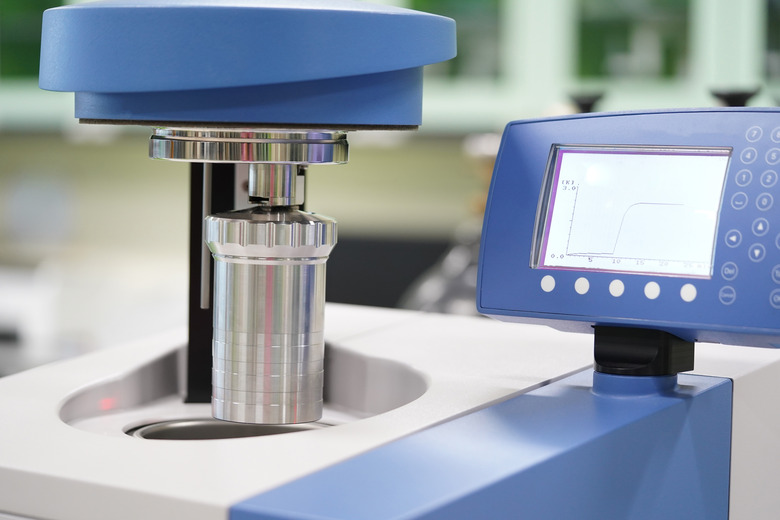How To Solve For Final Temperature In A Calorimeter
With a calorimeter, you can measure reaction enthalpies or heat capacities using the final temperature (Tf) of the contents. But what if you know the reaction enthalpy of your reaction and the heat capacities of the materials you are using and you want to predict what Tf will be instead? You can do this too — and in fact, this kind of problem is a common question on quizzes in chemistry classes.
Step 1
Reread the homework/quiz question and determine what information you can extract from the question. You will probably be given a reaction enthalpy, the calorimeter constant and the heat capacity of the mixture formed by the reaction in the calorimeter, together with the starting temperatures.
Step 2
Assume the calorimeter is perfect, i.e. that it does not lose heat to its environment.
Step 3
Remember that in a perfect calorimeter, the heat given off by the reaction is equal to the sum of the heat gained by the calorimeter and the heat gained by its contents. Moreover, both the calorimeter and its contents will reach the same final temperature — Tf. Consequently, you can use this information to write the following equation: Reaction enthalpy = (heat capacity of contents) x (mass of contents) x (Ti – Tf) + (Calorimeter constant) x (Ti – Tf) where Ti is the initial temperature and Tf is the final temperature. Notice that you're subtracting Tfinal from Tinitial and not the other way around. That's because in chemistry, reaction enthalpies are negative if the reaction gives off heat. If you want, you can subtract Ti from Tf instead, as long as you remember to flip the sign on your answer when you're done.
Step 4
Solve for Tf as follows: Reaction enthalpy = (heat capacity of contents) x (mass of contents) x (Ti – Tf) + (Calorimeter constant) x (Ti – Tf)
Factor (Ti – Tf) out of the right side to yield: Reaction enthalpy = (Ti – Tf) x ( (heat capacity of contents) x (mass of contents) + (Calorimeter constant) )
Divide both sides by ( (heat capacity of contents) x (mass of contents) + (Calorimeter constant) ) to yield the following: Reaction enthalpy / ( (heat capacity of contents) x (mass of contents) + (Calorimeter constant) ) = Ti – Tf
Flip the sign on both sides then add Ti to both sides to yield the following: Ti – ( Reaction enthalpy / ( (heat capacity of contents) x (mass of contents) + (Calorimeter constant) ) ) = Tf
Step 5
Plug in the numbers given you as part of the question and use them to calculate Tf. For example, if the reaction enthalpy is -200 kJ, the heat capacity of the mixture formed by the reaction is 0.00418 kJ/gram Kelvin, the total mass of the products of the reaction is 200 grams, the calorimeter constant is 2 kJ / K, and the initial temperature is 25 C, what is Tf?
Answer: First, write out your equation: Tf = Ti – ( Reaction enthalpy / ( (heat capacity of contents) x (mass of contents) + (Calorimeter constant) ) )
Now, plug in all your numbers and solve: Tf = 25 degrees – (-200 kJ / (0.00418 kJ/g K times 200 g + 2 kJ/K) ) Tf = 25 degrees – (-200 kJ / 2.836 kJ/K) Tf = 25 + 70.5 Tf = 95.5 degrees C
Things Needed
- Pencil
- Paper
- Calculator
References
- "Chemical Principles: The Quest for Insight"; Peter Atkins, et al.; 2008
Cite This Article
MLA
Brennan, John. "How To Solve For Final Temperature In A Calorimeter" sciencing.com, https://www.sciencing.com/solve-final-temperature-calorimeter-8381335/. 8 May 2011.
APA
Brennan, John. (2011, May 8). How To Solve For Final Temperature In A Calorimeter. sciencing.com. Retrieved from https://www.sciencing.com/solve-final-temperature-calorimeter-8381335/
Chicago
Brennan, John. How To Solve For Final Temperature In A Calorimeter last modified March 24, 2022. https://www.sciencing.com/solve-final-temperature-calorimeter-8381335/
